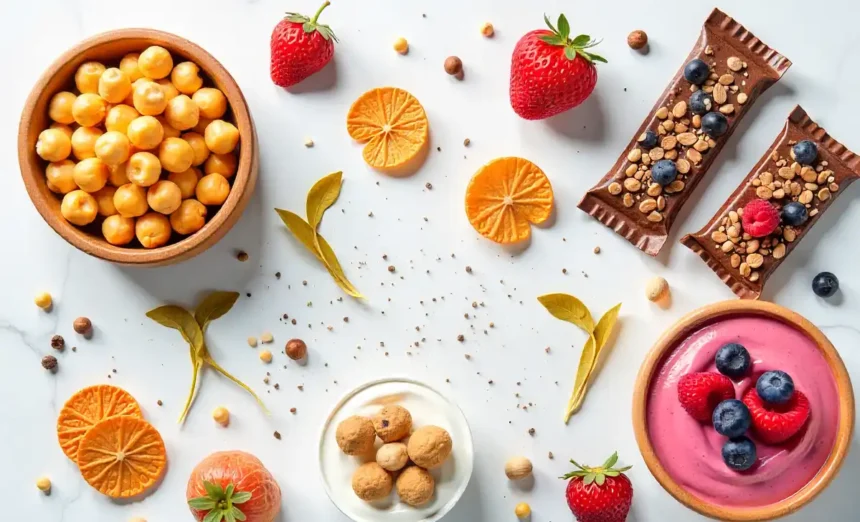Health-conscious shoppers are increasingly seeking high protein snacks that deliver both muscle-supporting protein and gut-healthy fiber. The convenience of buying healthy snacks online through retailers like Amazon Fresh and delivery apps like Instacart has made it easier than ever to find quality options.
This comprehensive guide explores trending high fiber snacks picks backed by 2025 market data, expert recommendations, and real purchase trends that support your wellness goals.
Why Choose Snacks That Are High in Protein and Fiber?
The combination of protein and fiber creates a nutritional powerhouse that addresses multiple health needs simultaneously. A significant proportion of US consumers are trying to consume more protein (56%), more fiber (53%), less sugar (58%), and fewer carbs (47%), driving demand for effective high protein snacks that deliver balanced nutrition.
Fiber-infused protein bars, energy bites, and even beverages with suspended fiber particles are gaining momentum, as they cater to both satiety and gut health without adding excessive sugars or calories. This trend represents the evolution from simple hunger control to strategic nutrition, with options ranging from plant-based protein snacks to keto-friendly snacks.
The Science Behind the Combo
Protein serves as the building block for muscle repair, sustained energy, and appetite control between meals. When combined with fiber, these nutrients work synergistically to provide longer-lasting satisfaction and better blood sugar stability than traditional snacking approaches.
Fiber improves digestion, feeds beneficial gut bacteria, and creates that crucial feeling of fullness that prevents overeating later in the day. According to Healthline, Americans consume only about 15 grams of dietary fiber daily, roughly half the recommended 25-38 grams for optimal health.
The high fiber snacks market is set to increase from $24.34 billion in 2024 and is predicted to reach a significant $26.6 billion by 2025, with an impressive compound annual growth rate (CAGR) of 9.3%. This growth reflects increasing consumer awareness of fiber’s importance for digestive wellness and weight management.
Expert Guidelines for Effective Snacking
Registered dietitian Maggie Kunik recommends looking for snacks containing at least 5 grams of protein and 3 grams of fiber per serving. Products labeled as “high in” protein or fiber must contain at least 20% of the recommended daily intake per serving.
Holistic nutritionist Katelyn Bedford emphasizes choosing third-party tested, minimally processed products free from unnecessary additives. This approach ensures you receive genuine nutritional benefits rather than marketing hype disguised as health food.
Look for snacks where whole foods appear first in ingredient lists, as these typically provide better overall nutrition and fewer artificial components than heavily processed alternatives.
Top High-Protein and High-Fiber Snacks for 2025
High protein snacks innovations are booming – from fortified bars to collagen-infused cookies and grain-free protein bites. The market has evolved beyond basic protein bars with fiber to include diverse options that satisfy different taste preferences and dietary requirements, including gluten-free protein snacks and low-sugar snacks.
Protein bars are expected to remain at the forefront with a share of approximately 40.7% in 2025, but exciting alternatives are gaining significant market traction.
Savory Protein and Fiber Options
Roasted chickpeas lead the savory category, typically providing 6+ grams of plant protein and 5 grams of fiber per serving. These crunchy fiber-rich snacks for digestion satisfy the desire for something substantial while delivering plant-based nutrition that supports digestive health and muscle maintenance.
Protein-fortified savory snacks (like protein crackers, pretzels, chips, and popcorn), savory bean snacks (like lentil crisps and chickpea puffs), low-carb/keto chips, and protein cheese puffs are experiencing unprecedented growth. HIPPEAS chickpea puffs and Smartfood protein popcorn are among the popular choices for healthy savory snacks.
Edamame snacks offer another excellent option among on-the-go healthy snacks, available in various flavors from sea salt to spicy varieties. Lentil and bean crisps have gained popularity as healthier alternatives to traditional potato chips, delivering excellent protein and fiber content with satisfying crunch.
Sweet High-Protein and High-Fiber Treats
Chia pudding cups provide convenient sweet satisfaction, naturally high in both nutrients. Many brands now offer ready-to-eat versions in flavors like vanilla, chocolate, and berry that address sweet cravings while supporting nutrition goals.
Natural Delights Cacao Pecan Mini Medjools deliver 5 grams of fiber and 3 grams of protein in each four-piece serving, representing the trend toward naturally sweet options without added sugars.
RXBAR Chocolate Sea Salt uses real food ingredients to bring you a tasty bar with 12 grams of whey protein and 5 grams of fiber, and 200 calories, exemplifying how modern snack technology creates satisfying options without compromising nutritional integrity.
2025 Market Trends and Consumer Preferences
High-protein labels now appear on products as diverse as sweet rolls, chips, and pretzels, with even a high-protein version of a Snickers bar. However, consumers are becoming more sophisticated about distinguishing genuine nutrition from marketing claims.
Cottage cheese is re-emerging as a beloved food item with a 17% increase in the share of purchases in 2024, thanks to its protein-rich benefits, reflecting the broader trend toward traditional foods with proven nutritional profiles.
Social Media Influence on Snacking
The “100 grams of protein per day” challenge has driven significant interest in high-protein snacks across TikTok and Instagram. Brands like Barebells, Core Power Elite, and Ka’Chava have benefited from users sharing their daily protein tracking journeys.
Chia seeds are experiencing renewed popularity beyond traditional pudding applications, with creative users showcasing savory applications like sprinkling on salads or mixing into wraps for added nutrition and texture.
This social media influence pushes brands to develop innovative products that photograph well while delivering genuine nutritional benefits, creating a win-win situation for both consumers and manufacturers.
Online Grocery Shopping Patterns
Instacart and other delivery platforms reveal fascinating insights into actual purchasing behavior. Peanut butter protein granola consistently ranks among the top sellers, likely due to its versatility and familiar flavors that appeal to various age groups.
Lentil crisps have gained significant traction as consumers seek alternatives to traditional chips that don’t sacrifice taste for nutrition. These products offer a satisfying crunch while delivering plant-based protein and fiber that supports digestive health.
Common Myths About High-Protein and High-Fiber Snacks
Despite growing nutritional awareness, several misconceptions persist that can lead to poor purchasing decisions and disappointment with results. Understanding these myths helps make more informed choices and avoid products that don’t deliver promised benefits.
Myth 1: All high-protein snacks are automatically healthy choices. These claims don’t always mean the food is good for you, as many protein products contain high amounts of added sugar, artificial flavors, and preservatives that counteract nutritional benefits. Always check labels when selecting the best protein snacks for weight loss.
Myth 2: More protein always equals better health outcomes. While protein is important, excessive intake can cause digestive discomfort and doesn’t provide additional benefits once you meet your body’s daily requirements for muscle maintenance and repair.
Myth 3: High-fiber snacks taste bland and unappetizing. Modern food technology and creative recipes have produced fiber-rich options that rival traditional snacks in taste and satisfaction while providing superior nutritional value and digestive benefits.
Identifying Quality vs. Marketing Hype
Check protein-to-fiber ratios to ensure balanced nutrition rather than just one macronutrient in isolation. Products providing both nutrients typically offer better value and satisfaction than those focused solely on protein content.
Look for protein sources from whole foods rather than isolated powders when possible. These options often provide additional nutrients and tend to be more satisfying than heavily processed alternatives with lengthy ingredient lists.
Choosing Snacks for Your Specific Lifestyle
Your ideal high-protein and high-fiber snack depends on your schedule, preferences, and health goals. Different lifestyles require different approaches to snacking, and understanding these distinctions helps select options that work for your daily routine.
Busy Professional Needs
Portable options like mixed nuts, bean crisps, or individual nut butter packets work well for office environments and travel schedules. These choices don’t require refrigeration and fit easily in briefcases, purses, or desk drawers for convenient access. Consider Greek yogurt bites or KIND Snacks bars for additional variety in your healthy snacks with protein and fiber rotation.
Consider snacks that won’t create a mess or strong odors in shared workspaces while providing sustained energy for long meetings or challenging projects. Single-serving packages help with portion control while ensuring appropriate choices for different situations.
Fitness Enthusiast Requirements
Bars and shakes with balanced macronutrients support workout performance and recovery goals, providing adequate protein for muscle support while including carbohydrates for energy and fiber for digestive health. Nature Valley and Clif Bar offer excellent options for fitness-focused individuals.
Timing matters for active individuals, so choose options that digest well before exercise while providing sustained energy throughout workout routines. Post-workout selections should emphasize protein for recovery while maintaining fiber for overall wellness. Consider snack subscription boxes for variety in your fitness nutrition routine.
Weight Management Support
Snacks under 200 calories that provide at least 5 grams of protein and 3 grams of fiber offer optimal combinations for supporting weight goals. These options control hunger between meals without adding excessive calories to daily intake.
Focus on high satiety value snacks that create lasting satisfaction relative to calorie content, supporting sustainable eating habits rather than restrictive dieting approaches that are difficult to maintain long-term.
Conclusion
Making smart snacking choices doesn’t have to be complicated when you understand what to look for in high protein snacks and high-fiber options. The key is finding products that deliver at least 5 grams of protein and 3 grams of fiber per serving while prioritizing whole food ingredients over heavily processed alternatives.
The 2025 market offers more variety than ever before, from traditional options like roasted chickpeas to innovative products like protein-fortified granola and chia pudding cups. Social media trends and online grocery data show that consumers are becoming more sophisticated about reading labels and choosing snacks that truly support their health goals.
Remember that the best snack is one you’ll enjoy eating consistently. Start with a few options that appeal to your taste preferences and lifestyle needs, then gradually expand your choices as you discover what works best for your daily routine and wellness objectives.
Whether you’re a busy professional needing portable options, a fitness enthusiast seeking recovery support, or someone focused on weight management, a perfect high-protein and high-fiber combination is waiting for you online.



